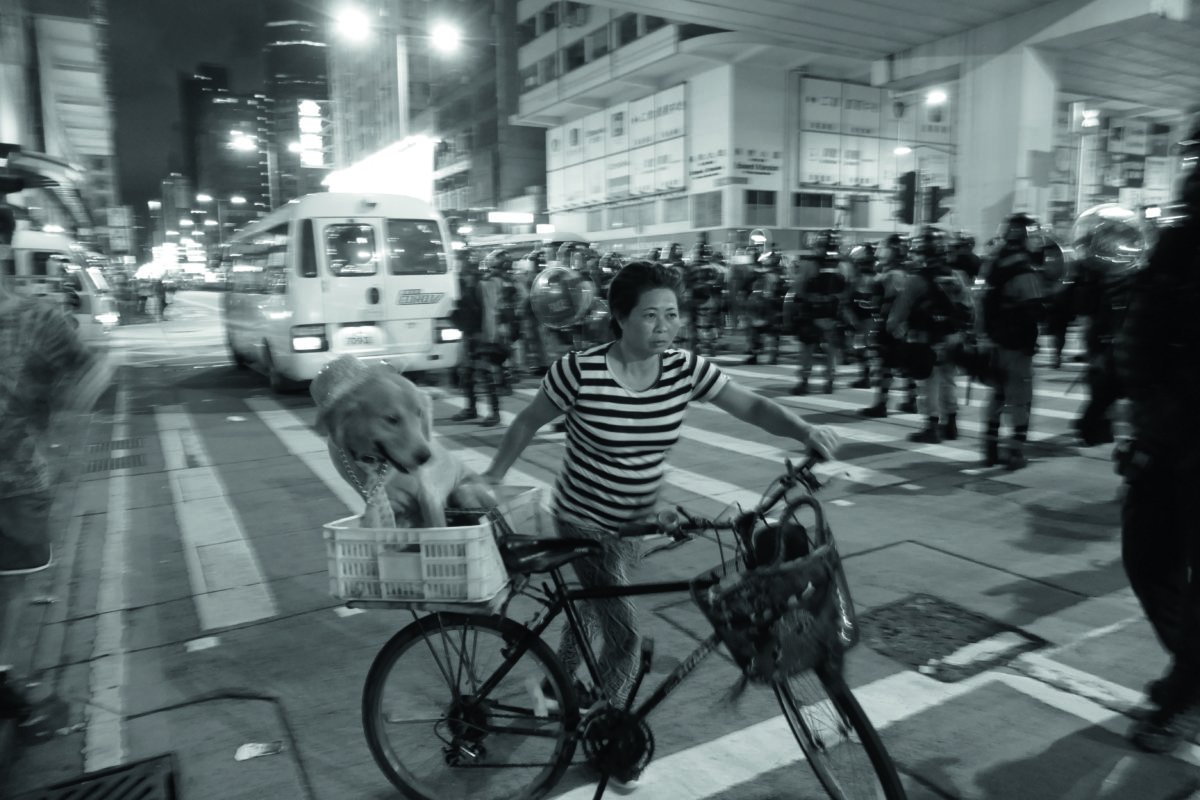Over the months of Hong Kong’s protests a friend and I often discussed the irony of the lyrics of the National Anthem. So, when I opened the South China Morning Post the day after National Day, with Beijing celebrations, Hong Kong’s protests and the shooting of a secondary school student fresh in my mind and confirmation that the reporter of local Indonesian newspaper Suara had lost an eye to a police rubber bullet wantonly shot into a group of reporters as police retreated down a stairwell on the Immigration Tower overpass, I did a doubletake – was someone making a spoof? No, it was serious. In a full-page front cover advertisement sponsored by two Hong Kong business associations the National Anthem’s lyrics were reproduced to “Warmly celebrate the 70th founding anniversary of the People’s Republic of China 1949-2019”.
But have these patriots ever read the lyrics? They are particularly and potentially incendiary in the context of Hong Kong’s current political crisis. They are:
“Arise, we who refuse to be slaves!
With our very flesh and blood,
Let us build our new Great Wall!
The peoples of China are at their most critical time,
Everybody must roar defiance.
Arise! Arise! Arise!
Millions of hearts with one mind,
Brave the enemy’s gunfire, March on!
Brave the enemy’s gunfire, March on! March on, on!”
Taken literally, these words could justify the actions of Hong Kong protesters. Or, they could have an ironic, critical ring about Hong Kong’s political situation and its leadership. Or, they could be read, as intended by Tian Han the lyric’s composer, to remember the heroic deeds of the volunteers who were fighting against the Japanese invasion of Manchuria in 1934.
I am no longer shocked by the lack of sensitivity seen during Hong Kong’s protests. Communication from the ‘players’ in this political crisis is now done through a type of megaphone diplomacy: advertisements and statements made through newspapers and press conferences, then redistributed through video on media outlets and social media. The Lennon Walls are a profusion of graphics, text, pronouncements and smart imagery – and points of physical conflict. There is now such distance between protagonists. There is no real sit-down discussion between opponents. And, no ‘head-to-head’ debate, except confrontation on the streets.
The actions of the protesters are increasingly being depicted in posters as heroic. But, unfortunately, it resembles and replicates the propaganda of past historical conflicts and events: akin to First World War posters, Soviet-era propaganda and the fantasy depictions of Chinese Cultural Revolutionary workers, soldiers and writers whose pens are held aloft as if they were fixed bayonets. Now depicted are gas-masked, helmeted frontline Hong Kongers at the barricades.
The Shanghai-based artist, ‘cartoonist’, intellectual and critic Feng Zikai also witnessed the Japanese war years and his writings and drawings variously poked fun at the Japanese invader, Kuomintang inefficiency and above all extolled the virtues of a moral approach – replicating his own Buddhist ideas – to life. His drawings never descended into propaganda. His work remains contemporary, and relevant – he reminds us that conflict is temporary, and that:
“Our land is being overrun by a vicious enemy. It is as though we are in the throes of a disease, and only strong medication can help us fight this illness and survive. The war of resistance is just such a timely treatment. Yet warfare can never be more than a short-term remedy, and we should be wary of becoming addicted to it. As the virus is eliminated and we regain out health, it is essential that we take proper nourishment. And what kind of nourishment is crucial to our long-term well-being? Peace, happiness, and universal love, and the basic ingredient for ‘preserving life’ itself: art.”
In Feng Zikai’s view, heroism is better expressed in the people and actions of our everyday lives. I have seen countless examples of small acts of heroic behaviour and kindness over the last months. For example, a local Prince Edward resident well-known for her dog who happily sits on the back of her bicycle, accidently passed as a police tear gas clearance was happening outside Mong Kok Police Station. I photographed her. Her dog is nonchalant and oblivious of the danger, she however is fearful. Quickly, with the assistance of other onlookers, she found an escape route and cycles away from the police and that night’s trouble. Everyone involved, without fuss, self-aggrandizing and unseen in the recorded photograph, were heroes.








